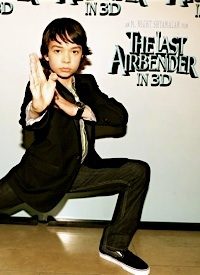
The Last Airbender is M. Night Shyamalan’s ninth directorial effort and is an imaginative and wonderfully visual film — as long as no one is talking. For a director on his ninth feature who has shown that he is capable of eliciting an academy award worthy performance from child actor, Haley Joel Osment, in his breakout film The Sixth Sense, there is absolutely no excuse for the excruciatingly hackneyed child performances in this film.
The only possible explanation — aside from ineptitude — is that Shyamalan is attempting to mimic the feel of the cartoon series, Avatar: The Last Airbender, on which the film is based. Regardless of the reason or excuse, the resulting performances of the child actors in this film are a travesty. That blame should fall squarely on the director’s shoulders, especially when the problem is endemic. The fact that the film is also written by Shyamalan fortifies the notion that the inherent problems in the film can not be chalked up to miscasting. As this is Shyamalan’s film through and through, it must be his failure through and through as well.
The story takes place in a mythological world in which nations are separated by the particular elements that they are able to control. At this particular junction of time and space, the Fire Nation is attempting to assert its dominance over the rest of the nations. Airbender follows the young Aang, as played by newcomer Noah Ringer, on his inner journey to accept his role as the Avatar — a reincarnation of a messianic figure that is able to control all four "elements" (as understood in ancient times) — air, water, earth, and fire. The Avatar is also the only one in the world that can communicate with the spirit world.
As a young, recently reincarnated Avatar born into the Air Nation, Aang is initially only able to control the element of air. When he is told that, as the Avatar, he will never be able to have a family of his own, as his responsibility is to the whole human race, he runs away and is frozen beneath the arctic regions of the Water Nation. One hundred years later, a young water bender — bender being the classification of those in a nation that are able to control the nation’s element — and her brother discover Aang in the ice. He wakes up and believes that a mere day or two has passed since his running away from home. The rest of the film documents the journey of Aang and his friends in their attempt to unite the nations against the impending tyranny of the Fire Nation and the discovery of the power that lies within him as he pieces his past together.
The mythological setting and all of the "element bending" allow for lush set design and plenty of spectacular special effects sequences and it is in these areas, and these areas alone, that the film truly shines. The sight of various forms of water, air, earth, and fire being controlled by the Tai Chi style dances of the benders looks as realistic as magic can on screen and will leave the ten year old inside extremely exhilarated — that is until anything script-related happens (e.g., lines being spoken, plot points revealed, etc.) and the grown up inside is reminded that, in spite of the magnificent view, the film does not fulfill its potential.
The sad fact is that the story does have potential — potential that even Shyamalan’s deficiencies as a director and writer cannot completely hide. Or, perhaps, Shyamalan’s deficiencies could not completely hide that there still may be something left in the director worth having faith in. One would hope so as Airbender is planned to be the first film of a trilogy.
Very deep themes of loyalty, friendship, standing strong in the face of tyranny, and the nature of sacrifice are explored in the film. Alas! Explored is too deep a word. “The surface was scratched” would be a much better characterization of how the film handles its material. The most likely reason is that Shyamalan is afraid of losing his younger audience. This explanation would also account for the inexplicably amateur use of voice over that indulges in unnecessary exposition of a comparatively simple plot. But dumbing down a film for a younger audience is incredibly insulting to children — and the parents who have to sit through the film with their children — especially when one remembers that something as deep as The Chronicles of Narnia is meant for the same, young audience.
Airbender does, however, have one thematic moment that achieves some depth towards the end of the film. A wise member of the Fire Nation, Iroh, as played by Shaun Toub in the strongest performance of the film by far, kneels in the presence of the two moon spirits who live in this world in the forms of fish. His nephew asks him why gods would take on such menial form. Iroh replies that gods take on menial, physical form to “teach us humility.” This is a very Christological concept and were this theme more fully developed, the film would have undoubtedly been more intriguing. It is interesting to note, as well, that, according to his biography, Shyamalan was raised in the Hindu religion by his Indian parents, but attended both Catholic and Episcopal schools through high school. That his exposure to both Western and Eastern philosophies in his youth should find their way into his film is compelling to contemplate.
Unfortunately, by the time the film has reached the aforementioned moment, the interest of any savvy viewer will already have been lost and the moment goes to waste just like the final, breathtaking action sequence.
It should also be emphasized that the film is steeped in Eastern mysticism, and reincarnation is a main plot point. Some parents may find subjecting their children to this philosophy unsettling. That said, the Eastern philosophy in the film is very superficial and certainly no worse than that found in the Star Wars mythology.
As I exited the theater and entered the lobby, two boys were exuberantly mimicking the martial arts moves they had just witnessed on the screen and this touching sight almost retroactively elicited an enjoyment of the film from me — almost. The sight also aroused slight feelings of guilt that I was about to skewer an experience that had been a source of so much joy for them. Regardless, the juxtaposition of my disappointed head shaking with their jubilation, as they imagined that they had the power to control the elements, is perhaps the most succinct summation of the film. The Last Airbender will probably be enjoyed immensely by a ten year old — and possibly by his parents for the mere fact that it brings so much joy to their child. Unfortunately, everyone else should avoid The Last Airbender.
Photo: Actor Noah Ringer, who stars in the film, strikes a self-defense pose at the World Permiere in 3D of "The Last Airbender," on June 30 in New York: AP Images



